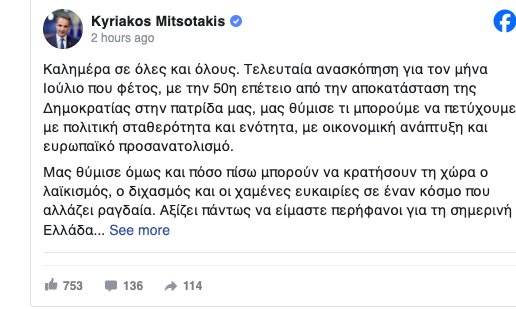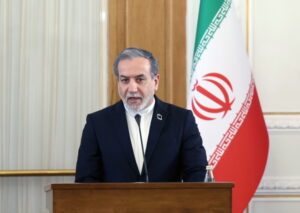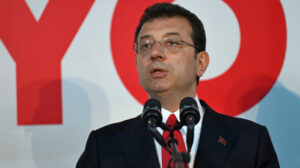In the final government review for July, the Prime Minister refers to the 50th anniversary of the restoration of Democracy, developments in health and education, the operation of myCoast, and the results of the Panhellenic exams.
Among other things, the Prime Minister highlights this year’s 50th anniversary of the restoration of Democracy in Greece and what we can achieve as a country “with political stability and unity, with economic growth and European orientation,” but also “how populism, division, and lost opportunities can hold the country back.”
Mr. Mitsotakis also refers to Greece’s progress in the Rule of Law, as noted in the European Commission’s annual report, the results of the Panhellenic exams announced on Friday afternoon, inspections on beaches through myCoast, and he couldn’t help but comment on the much-discussed Opening Ceremony of the Paris Olympics, which he attended in person.
“The opening ceremony of the Athens 2004 Olympic Games remains the gold standard. Not only for its aesthetics but primarily because it served as a guardian of the idea of Olympism and the games,” he writes characteristically.
Mitsotakis_anartisi_
In detail, the post:
“Good morning to all. The last review for July, which this year, with the 50th anniversary of the restoration of Democracy in our homeland, reminded us of what we can achieve with political stability and unity, economic growth, and European orientation.
But it also reminded us of how much populism, division, and lost opportunities can hold the country back in a rapidly changing world. Nevertheless, it is worth being proud of today’s Greece, which evolved from a weak Balkan country in 1974 into a strong, liberal, European Democracy. It was not a given linear evolution, considering the political deviations, civil divisions, and wars that characterized previous historical periods of the modern Greek state. That is why we should not forget or underestimate what we have achieved in these 50 years. Of course, there are still shortcomings in many key areas. And this is exactly the battle we are called to fight and are fighting now. To address old pending issues and new types of challenges in a fluid international environment so that our homeland can quickly converge with the advanced countries of Europe in wages, institutions, and state functioning, especially in health, education, and security.
I mentioned this in the anniversary session of Parliament, and I will say it here as well. In the struggle for the progress of the country and the prosperity of society, the political forces are called to be useful and constructive, obviously not agreeing on everything, but remembering that we are opponents and not enemies. Only in this way does Democracy consolidate and the country move forward.
And since an indicator of the quality of a democracy is the state of the Rule of Law, it is important that the European Commission, in its annual report on the image presented by member states in this matter, finds that Greece records from partial to significant progress in all 5 recommendations that were made to us in previous reports. The recommendations are now reduced to 4, as there was full compliance from Greece on the issue of the participation of judges in the selection of the leadership of the supreme courts. Moreover, Greece is one of the 9 countries among the 27 with the fewest recommendations, while 18 countries received more recommendations than Greece (including Germany, Spain, the Netherlands, Belgium, and Italy). Naturally, we do not rest on our laurels. There are other critical fields in which we must accelerate and improve to achieve a more functional and inclusive democracy that ensures fair growth, attracts more and better investments, reduces inequalities, and increases citizens’ trust in democratic institutions. That is why, in anticipation of the next cycle of European evaluation, we are starting an open process of regular dialogue with interested institutional partners and representatives of Civil Society through a platform for submitting ideas and addressing dysfunctions, based on the common premise that further strengthening the Rule of Law will benefit every citizen.
An indicator of a mature democracy is also the smooth operation of the National Health System (NHS), for the upgrade of which we are fighting a major battle with all our strength. In this fight, we are allies and not opponents with the medical community and healthcare staff. I am particularly pleased and want to thank from the bottom of my heart the private doctors who responded to the Ministry of Health’s call to cover all the on-call gaps we found, mainly in the specialty of internists, in isolated areas and hospitals of our country temporarily and for a limited period. I am also pleased that the medical community of Kos responded, which, as the island of Hippocrates, should set a good example by helping the hospital until the measures and incentives we established in the previous period bear fruit. We proceeded with major reforms such as the possibility of private work, afternoon surgeries, the establishment of the 2,100-euro allowance for relocation to the island and remote areas, and the tripling of the monthly allowance for doctors serving in so-called barren areas. The recession of the previous decade and the pandemic left wounds on the NHS that we are fighting to heal. We have a plan, resources, and the will to have a modern and European NHS by 2027. In my view, both the public and private sectors have a role in the NHS, always for the benefit of patients and without them being burdened. That is why we are making significant efforts to provide more incentives, make the NHS more attractive for young doctors to join, and offer better conditions for those already serving, especially in these areas that present particular challenges.
Caring for our most vulnerable fellow citizens is another quality indicator of a modern democracy. I consider the two government decisions made a few days ago and about which I wrote to you during the week particularly important. I refer to the re-expansion of the list of irreversible diseases, to which 17 more diseases were added. Thus, we put an end to the suffering of our fellow citizens who had to go through committees again and again to receive certification and the benefits they are entitled to. At the same time, new medical specialties and an additional 700 doctors are being added to the medical staff of the Disability Certification Centers (KEPA), with the total number reaching 1,200 from 500 today. Our constant goal is to improve the quality of life of people with disabilities, and we unwaveringly serve this goal.
This goal also converges with another provision for our disabled fellow citizens, their inclusion in the more favorable regulations of the out-of-court mechanism, which, anyway, with the positive changes we have made, provides for an additional “haircut” of up to 28% for the truly vulnerable. The result was evident in practice: applications almost doubled, from 14,000 in the first four months of 2023 to 25,000 in 2024.
Strengthening Democracy was also the participation of Greeks abroad in the elections, with the lifting of restrictions on their vote and with postal voting.
We continue to strengthen our ties with expatriates. Already, the Strategic Plan for the Greek Diaspora 2024-2027 has been put up for public electronic consultation, with which we proceed with six other major actions aimed at strengthening the ties of the metropolitan center with the Greek Diaspora and enhancing the Greek element worldwide. The new policies emphasize the more intensive promotion of Greek language education, the support and development of networks and structures of the Diaspora, the upgrade of services provided to Greeks Abroad, the maintenance of ties with the ecclesiastical institutions of Orthodoxy, and initiatives to attract young expatriates to Greek universities and curb brain drain.
Changing the subject, I want to tell you that this year the admission bases for universities were announced earlier than any other year. I want to congratulate all those who achieved their goal and are starting their academic journey at the public university we believe in, support, and prioritize. It is undoubtedly a vindication of the efforts of both themselves and their families. Those who, although they made the effort, were not rewarded, also deserve praise. This should not diminish their will to realize their dreams. The opportunities are many, and the future awaits them.
I also want to congratulate the students who participated in the 65th International Mathematical Olympiad, held in Bath, UK, and the Greek students who won six medals – one gold, two silver, and three bronze. A big bravo to the children and their teachers!
Our mission is to continuously improve the education provided, both in content and process, adapting it to the new data of the era. This goal is served by the Digital School (digitalschool.gov.gr), which was voted on Friday by Parliament, two months after we presented it to the Minister of Education from the Daily Gymnasium of Rizomata in Imathia. The Digital School will be piloted from the new school year, i.e., next September. I remind you that it is a new, free, integrated digital portal through which model tutoring sessions for students of all grades will be conducted, digital lessons for students in remote areas, and students will be able to communicate with their teachers in real-time, while parents will have the opportunity to be electronically informed about their children’s performance and school activity.
The funding of the Digital School was secured through the Recovery and Resilience Fund, like so many other critically important actions concerning society. One of these, concerning public health and implemented with funding from the “Greece 2.0” and the European Union-Next GenerationEU, is the National Action for Tackling Childhood Obesity 2024-2026. A few days ago, under the title “For the children, we become a shield,” the awareness campaign about the effects of unbalanced nutrition and lack of exercise on the health of children and adolescents started. It is the first comprehensive

Ask me anything
Explore related questions





